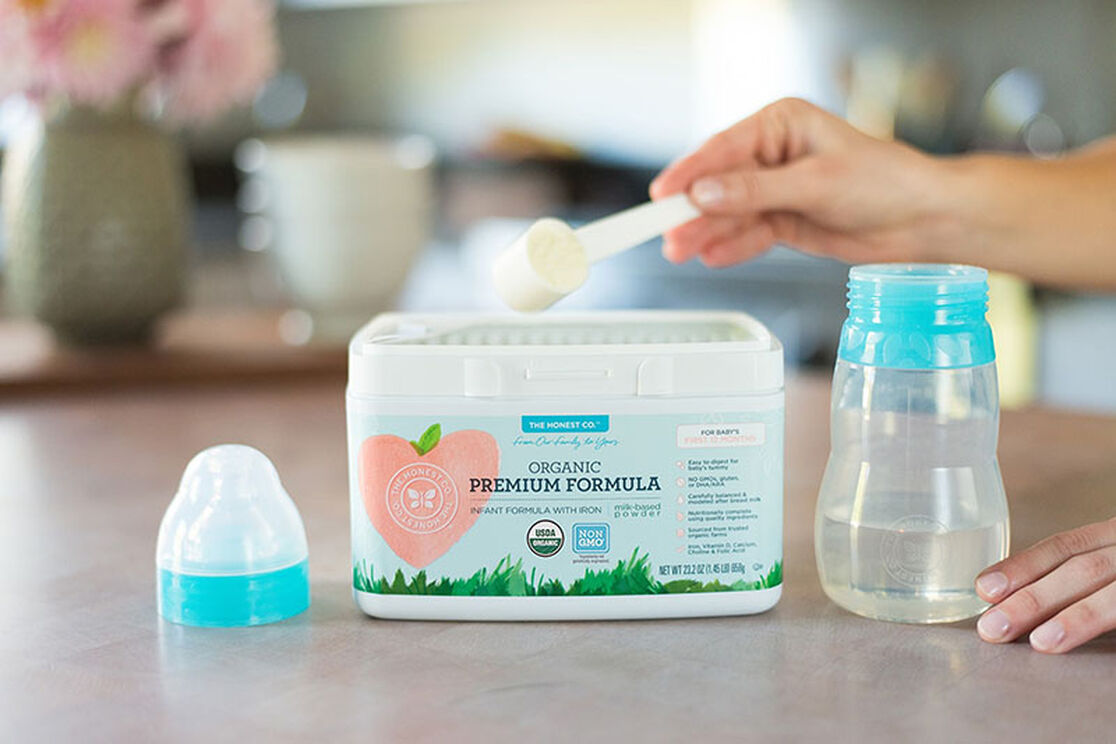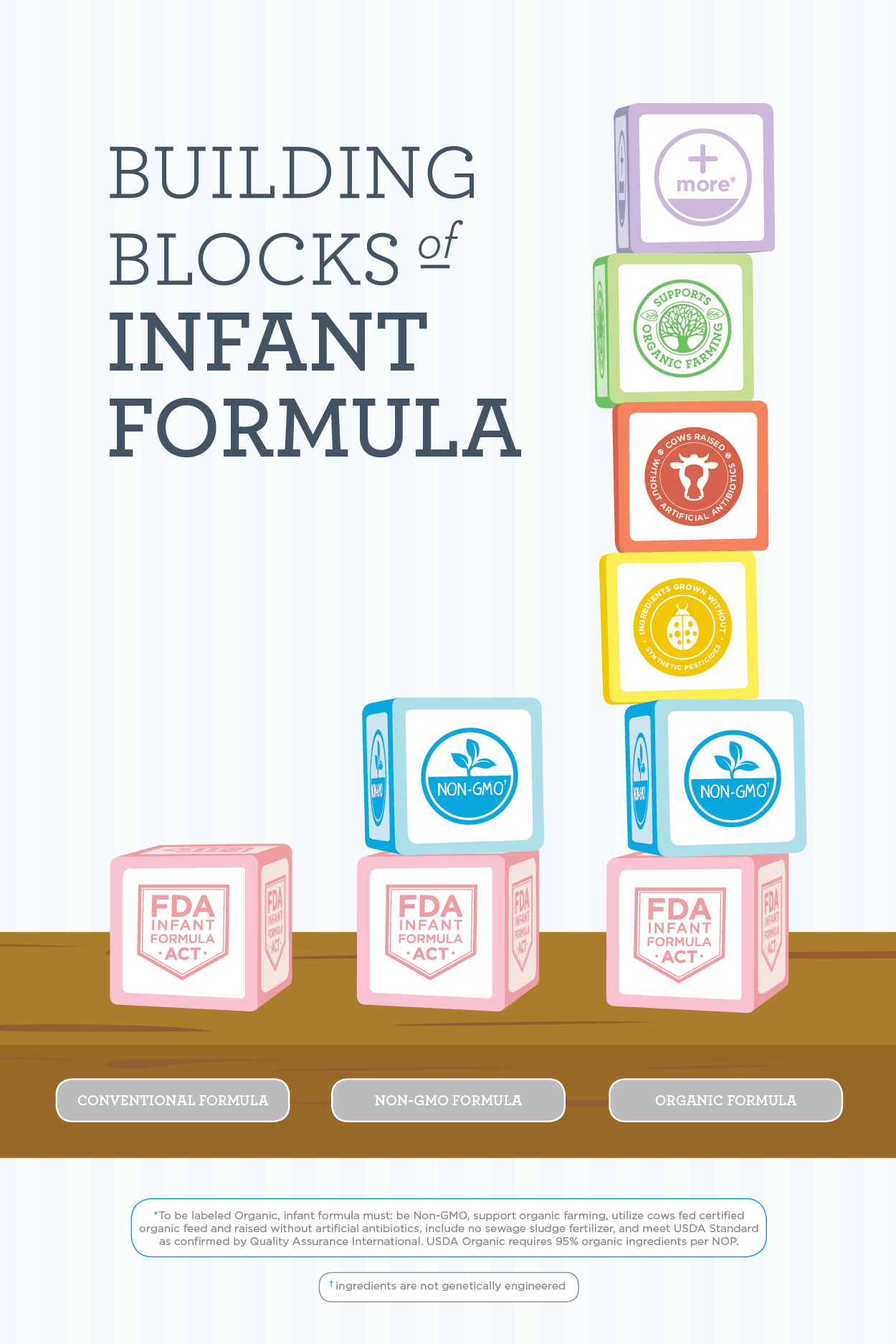At The Honest Company, we take a BEST-FOR-BABY approach in everything we do, and that includes supporting all types of feeding. We believe that how parents feed their babies is a personal decision based on the needs of their families. We also believe pediatricians, dietitians and lactation consultants are key resources for parents in making this important decision, if and when infant formula becomes necessary. But with so many different types of infant formulas available today, it isn’t always clear what the differences are and how to make the right choice for you and yours. That’s why we’re doing our part to provide insight into some of the different formula types, with a specific focus on the distinction between organic and a new type of infant formula on the market labeled “Non-GMO”.
FDA Infant Formula Act
By way of some (honest) background information, all companies that manufacture and distribute infant formula in the United States must adhere to the strict guidelines of the Food & Drug Administration’s (FDA’s) Infant Formula Act in order to ensure that the product meets the requirements needed for proper infant growth and development. The Infant Formula Act covers quality control requirements and procedures, nutrient specifications (located in section 412(i) of the FFDCA and 21 CFR 107.100 – these nutrient specifications include minimum amounts for 30 nutrients and maximum amounts for 9 of those nutrients) and rigorous testing processes.
What Does it Mean to Be a Non-GMO Infant Formula?
Infant formulas labeled as “Non-GMO” do not include genetically engineered ingredients. But what exactly are genetically engineered ingredients? They are ingredients that have had their DNA altered by the addition of genes from another ingredient species, which are often introduced to improve crop protection, breed faster growing animals, or increase nutritional value (1,2).
What Does it Mean to Be an Organic Infant Formula?
Infant formulas labeled as “organic” do not include genetically engineered ingredients and also comply with the following USDA Organic regulations.
The United States Department of Agriculture (USDA) oversees the National Organic Program (NOP), which defines organic as:
- Organic food is produced without using most conventional pesticides; fertilizers made with synthetic ingredients or sewage sludge; bioengineering; or ionizing radiation.
- Food produced by farmers who emphasize the use of renewable resources and the conservation of soil and water to enhance environmental quality for future generations.
- Meat, poultry, eggs, and dairy products that come from animals who are given no antibiotics or growth hormones.
- Food produced without genetically engineered ingredients.
Before a product can be labeled “organic,” a Government-approved, third party certifier inspects the farm where the food is grown to ensure the farmer is in compliance with USDA organic standards.
So to be clear, like Non-GMO formula, organic infant formula has no genetically engineered ingredients, by law. Organic is, and always has been, Non-GMO...and more!
With all of this information in mind, and to better help you make the right decision for you and your family, we wanted to provide you a clear visual representation of the differences between conventional, Non-GMO and organic infant formulas.
Why Did We Choose to Create an Organic Formula?
As we outlined above, organic food has a wide variety of benefits. Not only are organic foods grown without conventional pesticides and sewage sludge, but they also promote responsible farming methods that protect the environment for future generations. In addition, organic foods must be produced without genetically engineered ingredients.
“Non-GMO” has been a hot topic for quite some time. In 2015, 300 researchers from around the world released a statement emphasizing that there’s no consensus on safety and that more research needs to be done to establish whether foods with genetically engineered ingredients are safe or not (6). Still, in May of 2016, the National Academy of Sciences released a report stating genetically engineered crops pose no additional risks to health when compared to conventional foods (7). The study also found that the use of genetic engineering has increased pest resistance, which according to the study, is a "major agricultural problem."
Our Organic Infant Formula is (and always has been) “Non-GMO” (made without genetically engineered ingredients). Although the jury is still out on the ultimate pros and cons of genetic modification, in line with our steadfast commitment to transparency and consumer clarity, we have updated our Organic Infant Formula label to include this important distinction.
When we decided to create an infant formula, we crafted a formula carefully modeled after breast milk, with complete infant nutrition supplied by high quality ingredients.
We are committed to:
- Creating high-quality, organic, Non-GMO (no genetically engineered ingredients) infant formula and supporting all feeding needs by offering trusted solutions for both mom and baby.
- Offering complete infant nutrition modeled after breast milk to support your baby (should you need it) during this critical time of development.
- Providing the information that allows you to make the decisions that best fit you and your family.
- Doing our part to support organic, Non-GMO, sustainable farming.
Join us – together we can make it better!
References:
- Frequently asked questions on genetically modified foods. (n.d.). Retrieved January 18, 2016, from http://www.who.int/foodsafety/areas_work/food-technology/faq-genetically-modified-food/en/
- Bruton, S. V. (2013). GMO Food Labeling. Encyclopedia of Food and Agricultural Ethics. Hilbeck, A., Binimelis, R., Defarge, N., Steinbrecher, R., Székács, A., Wickson, F., ... & Novotny12, E. (2015). No scientific consensus on GMO safety. Environmental Sciences Europe, 27(1),
- Genetically Engineered Crops: Experiences and Prospects. (n.d.). Retrieved June 30, 2016, from http://www.nap.edu/catalog/23395/genetically-engineered-crops-experiences-and-prospects
We aim to provide you with the most honest and credible information possible. This article was reviewed for accuracy by The Honest Team and was written based on sources that are linked at the bottom of the article.
blog_review_statement




